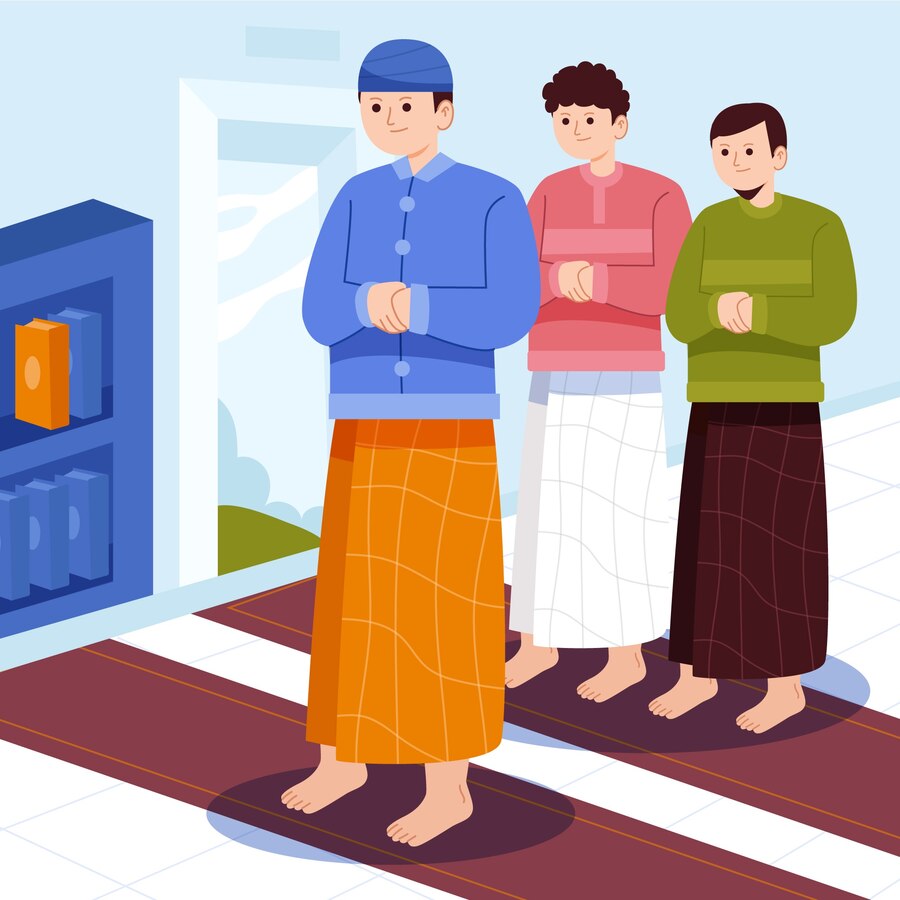Tarawih Prayer
Tarawih Prayer
Taraweeh prayer is a Sunnah (voluntary) prayer performed during the month of Ramadan. It is prayed after the Isha prayer and before the Witr prayer. Its name is derived from the Arabic word “tarawih,” which means rest. This is because the prayer is performed in a leisurely and relaxed manner, with breaks between each set of rak’ahs. Like with other acts of worship (e.g., making dhikr, reading the Quran, etc.), praying Taraweeh is encouraged during Ramadan. Within the prayer, we increase our connection with Allah (SWT) and earn more rewards with each Rakat (rak’a, rakah) we pray.

In one hadith, narrated by Abu Huraira, the Prophet Muhammad (ﷺ) even said,
Whoever stands (in the voluntary night prayer of) Ramadan out of faith and in the hope of firm belief and hoping for reward, all his past sins will be forgiven.” (Sahi Bukhari)
“جو شخص رمضان کی راتوں میں ایمان اور یقین کے ساتھ اور ثواب کی امید کے ساتھ قیام کرتا ہے، اس کے پچھلے تمام گناہ معاف کر دیے جاتے ہیں۔” (صحیح بخاری)

How to Pray Taraweeh (Tarawih)
There are two most common methods of praying Taraweeh adopted by Muslims, i.e., the 20 rak’ahs method and the 8 rak’ahs method, with a short break after every 4 or 2 rakats. After completing the 4 rak’ahs, the tarawih dua is performed before the start of the next tarawih rak’ah. Regardless of the method used, each Tarawih Rakat begins with the recitation of Surah Al-Fatiha followed by a portion of the Quran recited. The Witr prayer is then performed after the tarawih prayer is completed.
It is also highly encouraged to perform Taraweeh in congregation, as this is the Sunnah of the Prophet Muhammad (ﷺ). As narrated from Abu Dharr (may Allah be pleased with him), the Messenger of Allah (ﷺ) said:
“Whoever stands with the imam, until he finishes, it is equal to spending the whole night in prayer” (Trmidihi Sharif)
تراویح باجماعت ادا کرنے کی بھی بہت زیادہ ترغیب دی جاتی ہے، کیونکہ یہ نبی کریم صلی اللہ علیہ وسلم کی سنت ہے۔ جیسا کہ ابوذر رضی اللہ عنہ سے روایت ہے کہ رسول اللہ صلی اللہ علیہ وسلم نے فرمایا:
“جو شخص امام کے ساتھ کھڑا رہے، یہاں تک کہ وہ فارغ ہو جائے، یہ پوری رات نماز میں گزارنے کے برابر ہے۔” (ترمذی شریف).
Special Dua to Recite for Tarawih Prayer
In many masjids, some worshippers often recite some words of remembrance during the ‘break’ periods between every four rak‘at (two two-unit prayers). You may find the words displayed around the masjid. The Arabic words and English translation are as follows:
سُبْحانَ ذِي الْمُلْكِ وَالْمَلَكُوتِ سُبْحَانَ ذِي الْعِزَّةِ وَالْعَظْمَةِ وَالْهَيْبَةِ وَالْقُدْرَةِ وَالْكِبْرِياءِ وَالْجَبَرُوْتِ سُبْحَانَ الْمَلِكِ الْحَيِّ الَّذِيْ لا يَنامُ وَلا يَمُوتُ. سُبُّوْحٌ قُدُّسٌ رَبُّنا وَرَبُّ المْلائِكَةِ وَالرُّوحِ اللَّهُمَّ أَجِرْنا مِنَ النّارِ يا مُجيرُ يا مُجيرُ يا مُجيرُ
After the Tarawih, there is the Witr Prayer of three rak`ahs. In Ramadan, these can be performed in congregation and aloud. In a mosque, short surahs are usually recited during these rak`ahs. After the ruku` (bowing) of the last rak`ah, it is a Sunnah for the imam to supplicate aloud before prostrating. The congregation should answer “Ameen” after each line of the dua (supplication). This supplication after ruku` is known as qunoot.
The Witr should be the last prayer performed before dawn. So if you are praying Tarawih in the congregation and wish to perform additional Tahajjud (optional late-night) prayers later, you may skip the Witr in the congregation and perform it after Tahajjud.
Benefits of Taraweeh (Tarawih) Prayer
Time to Draw Closer to Allah (SWT)
The long and peaceful prayer session allows us to reflect on our relationship with Allah (SWT). Within each action during the tarawih prayer, we grow closer to Allah (SWT), gain a better reward and appreciation of Him, and seek more of His forgiveness and blessings.
Increased Focus and Discipline
Performing Taraweeh prayers regularly requires discipline and commitment. This tarawih prayer makes our daily routine life disciplined and encourages us to manage routine activities and perform religious obligations. The lengthy prayer sessions encourage us to manage our time effectively. It urges us to prioritize our spiritual obligations while still fulfilling our daily responsibilities. It also helps us develop greater self-discipline, which we can also apply to other aspects of our lives, even beyond Ramadan.
Low-Impact Workout
Building Community Bonds
The way we pray Taraweeh also strengthens our sense of unity and community. Many mosques and community centers offer communal Taraweeh prayers, where Muslims from all walks of life come together to pray and worship. This sense of community is especially important during the month of Ramadan. It is time Muslims fast, share food, connect, and engage in other acts of worship together.
Tarawih Prayer Rewards
Frequently Asked Questions
Tarawih is a Sunnah prayer performed during Ramadan after the Isha prayer. The term "Tarawih" means "rest," reflecting the breaks taken during the prayer.
Tarawih can consist of 8 or 20 rakats. Both methods are widely practiced, and the choice often depends on the mosque or personal preference.
The importance of Tarawih lies in its spiritual rewards, as it helps Muslims draw closer to Allah and seek forgiveness for past sins. It is also an opportunity for community bonding.
There is no specific dua for Tarawih, but worshippers are encouraged to recite personal supplications, Quranic verses, or Sunnah prayers during or after Tarawih.
Tarawih and Tahajjud difference lies in timing and context. Tarawih is prayed in Ramadan after Isha, while Tahajjud is prayed after sleeping and can be performed year-round.
- Gold-Coast Grand Mosque (Tarneit): Offers 20 rakats.

